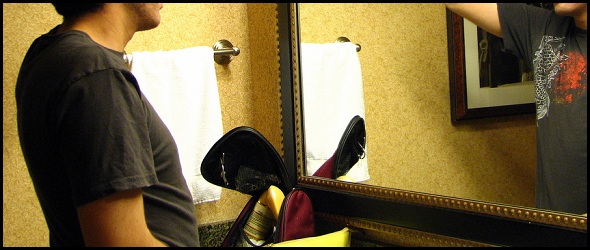I know I’m mentally healthy when I am able to honestly re-evaluate myself in all aspects – that I am able to get rid of all external factors and really reflect deeply about my thoughts, motivations, desires, etc. It’s only through personal honesty that we are able to make the decisions that really are best for us.
One of my proudest moments so far happened because I was honest with myself. On paper I lost, but it felt like a personal victory to be able to shed my pride and ego when it counted most.
OSClub 2003
It all started when I attended OSClub – an all expenses paid summer program at the Ontario Science Centre after my Grade 9 year. It was a really cool program, where you got to meet fifty other students across Toronto and learn about aerospace, biotechnology, telecommunications, engineering, and other fields in a fun, hands-on manner with lots of project-based and field trip experiences. Unfortunately, that program no longer runs, but it was pretty darn cool.
One of the perks of the program was that it had a connection with the International Space School in Houston, Texas. At the time, four Canadian high school students were selected annually to join several students from around the world in attending the International Space School – and two of those spots were promised to OSClub alumni of the two most recent years (one boy and one girl).
My First-Ever Interview
So after the program, I applied for the spot, and made the interview stage. It was actually my first ever interview, so that was kind of cool. In addition, it was a group interview – meaning that all of the finalists get asked the same question, and you take turns answering the question. It’s quite an interesting dynamic, as you get to hear other answers, which in turn might affect how you answer yours. For example, you don’t want your answer sounding exactly like someone else’s, so even if you would’ve came to the same conclusion yourself, you try to look for ways to differentiate yourself.
I don’t think I did great by any means, considering it was my first interview and I had no idea what to expect or how I would react. In the end, a Grade 10 boy and girl were selected to attend the space school. That being said, I later heard that they always selected the older students, and that the younger students were just brought along to the interview to gain some experience.
A Second Chance
A year went by before I had my second and last chance to apply. It was quite the year – I finally started get involved more in my school and community, and had a lot more confidence and experience than the year before. I really wasn’t the guy I was a year ago.
I made it to the interview stage again, except this time, they had all of the guys in one interview. There were three Grade 9 students, and two other Grade 10 students (who I was pretty good friends with). I was pretty sure that the situation would be the same as last time, and I was really only up against the other two guys my age – not bad odds.
I have always been competitive by nature, and after having not made it last time, I was super determined to finally break through.
As we went question through question, I honestly felt like I was completely owning the interview. I really felt like I was separating myself from the pack, and that I had the trip in the bag.
So Close…
But then came the final question: “What type of career are you interested in pursuing?”
For the first time that afternoon, I felt really affected by what was going around me. A bunch of these guys were answering the question saying that they were interested in aerospace engineering and other outer space-related careers. I couldn’t help but feel a bit sick inside because I felt pretty sure I wasn’t going to pursue anything space-related. Sure, it’s possible these guys were lying or stretching the truth, and were just saying whatever was necessary to secure the trip. But I couldn’t do it.
So when it finally got to my turn, this is what I blurted out:
You know what? Don’t pick me. These guys want this way more than I do. I’m not interested in pursuing a career in a space-related field. I’m interested in medicine.
And when I imagine myself going into space, it isn’t as an astronaut or scientist – it’s as a tourist, a visitor.
So don’t pick me.
It was a really weird feeling. I had spent all that time preparing, and doing really well in the interview, and I just threw it all away during the very last question.
It’s a no, but I’m okay
Needless to say, I didn’t get selected. Of course, it’s entirely possible I wasn’t going to be selected anyways.
In any case, it felt like the right thing to do, and I will always be proud of what I did there. If there was even a chance someone else in that room would have benefited more from the experience, it was definitely the right thing to do.
Fortunately for me, I was able to go to Shad Valley instead, and I was really happy with that.
No real message or lesson I’m trying to convey here, but it’s a story that’s important to me, so I wanted to share it with everyone.





